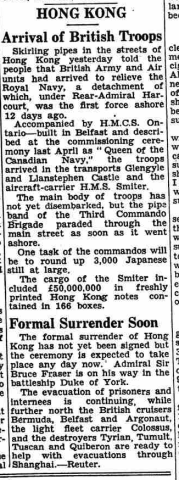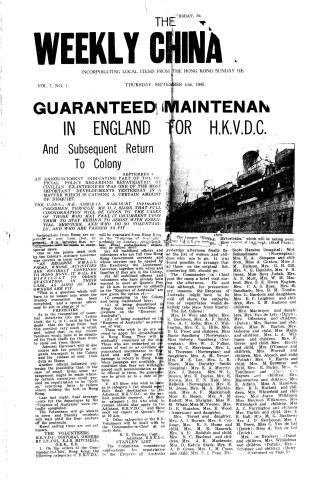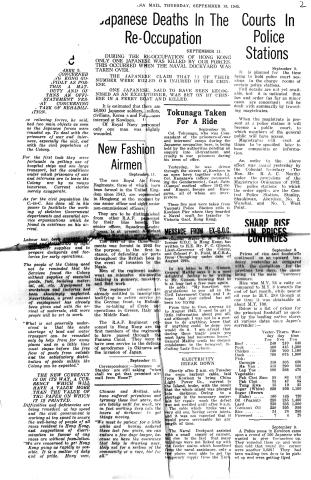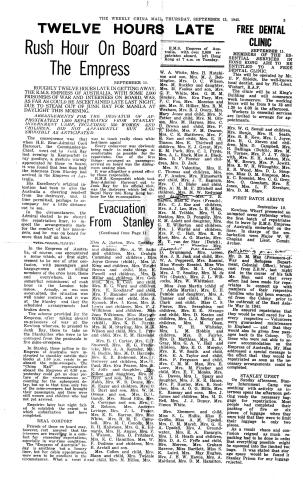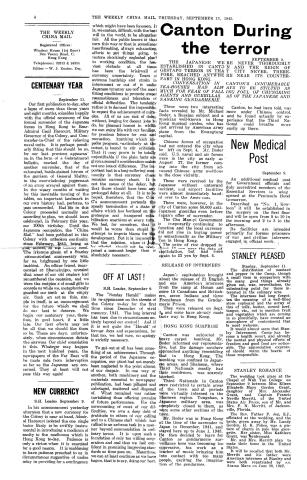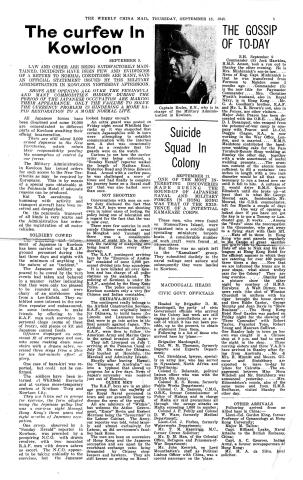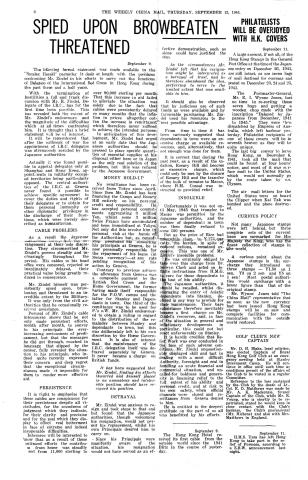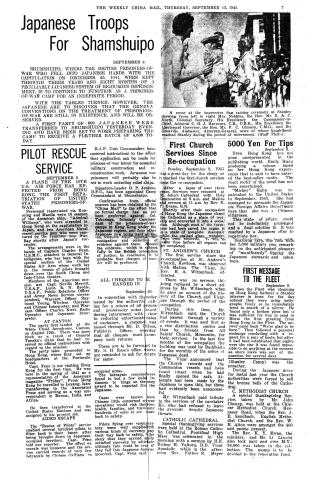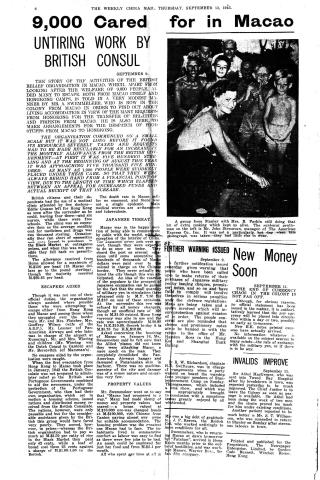Page 3 of the Belfast News-Letter reports the British Army arrived at Hong Kong yesterday:
Diary pages from this date
At last, on the 13th September 1945, we took off at 11 a.m. and saw Japan, and all the horror, and indescribable ghastliness which Japan had symbolised to us during the past four years, slip away beneath us, as we headed for Okinawa - our first stop on the way to home and our loved ones.
We left Japan in American US Air Force C-54's (DC-4’s), hastily equipped with rough seating made out of wooden 4 x 2's, we were each given a parachute. A very uncomfortable trip but we didn't care, only to be happy to be free again. We arrived at about 6.30 p.m. at Okinawa. On landing, we were given coffee and refreshments, before being taken by army trucks to a large, tented camp, about an hour's journey from the aerodrome. It was a large camp and about 3,000 of us ex-POWs were there. For the next few days, we did nothing but eat and sleep. The hospitality of the American Forces was tremendous. Luxuries we had not seen for many a year were to be had for the asking. They even had an ice-cream-making facility. We also were able to send telegrams to our families overseas. Unfortunately, it poured with tropical rain, nearly all the time we were there. The tents we were in were on a gently sloping area, so that the water came in one side and out the other. We were all on camp beds, so it didn't bother us too much. It was fun in an evening, to sit in the pouring rain, watching an outdoor movie!
On arrival, we were put into groups of 50 with a group number. All day long the loudspeakers called out group numbers. When your number was called it meant that we were required to gather at the Camp entrance, to be taken in trucks to the aerodrome. We were in this Camp for about four days, before our group was called. We were taken to the aerodrome and loaded into B-24 Liberators. Wooden 4 x 2's had been put in the bomb-bays. We sat on one and put our feet on another. There were about 20 of us in our plane. We took off with a rather frightening experience as, to allow light and air to enter, the bomb-bay doors were partly open. One could look down between one's feet and see the metal grid of the runway, rushing past. However, once in the air, we were allowed in ones and twos, to move to other parts of the aircraft and to have a chat with the pilot and crew. We flew South, skirting the east coast of Formosa, and eventually down the west coast of the Phili ppines, to Clark Field where we landed.
After a refreshing cup of coffee and doughnuts, we transferred to a smaller plane a DC-3 (Dakota), which took off and headed for a small airfield, just outside Manila. More coffee and doughnuts, before we were taken by truck to a large, tented Camp, near a large lake just outside the City. This was a huge camp, with ex-POWs from all over Japan and other occupied territories, including Hong Kong. Many joyful reunions took place, and anxious enquiries made regarding many friends and comrades.
We were (in our group) about twelve days in this camp. We were given a thorough medical check-up, inoculations, and outfitted with clothing. The Red Cross were on hand to help where necessary and keep us supplied with books, writing materials, cigarettes, etc. There were open-air cinema shows every night. Also, transport was available to take those who wished to go into Manila city, although few of us had any money.
Saw 'Coney Island' at Queen's, in technicolour, really lovely.
The weekend boats (if any) are for Australia.
Still working at Supreme Court, and finished too late to go on HMS Vindex.
We girls (stenos) have put our names down for the next boat, I hope it's soon because am feeling very weary and ready to go from this rather uncertain atmosphere.
Mr Gimson is leaving by plane at weekend.
The British Military Administration publishes a scale of punishments, including the death penalty for anyone inciting insurrection or publishing, possessing or circulating printed matter critical of the Administration, or 'in the interests of the enemy'.
'The enemy' - as Philip Snow, points out, this seems an example of the tendency to 'elide Japan and China into a single antagonist'!
Source:
Philip Snow, The Fall of Hong Kong, 2003, 273
Passed Corregidor 7.20am andered [and entered?] Manila 9.30am.
Over 150 vessels of all sorts anchored, several sunk inshore. Much aircraft about. Most harbours traffic done by landing barges. Buildings onshore look intact although there are signs of fire on some.
Conference held onshore.
Proceeded alongside 7.30pm.
Rained.
Many units got off.
Rec. R.C. message from Marj May 45 which tells me she is at home.
Alongside all night.
